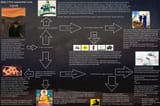Search Results
7/20/2025, 7:35:26 PM
>>510895233
>If God isn't real, then what should we/would we base our morality on and on whose authority?
Morality is the classification of things as right and wrong, and the associated reasoning. Broadly, "right" in a moral sense means producing desirable outcomes over all situations of interest, and "wrong" is what produces undesirable outcomes. It's possible to formulate this in relation to some religious code of behavior (a popular basis for deontological systems), but that's not the only way to do it. Virtue systems, for example, identify behaviors which tend to produce desirable and undesirable outcomes, and advise acting accordingly. Consequentialism is focused on the specific end results rather than how one gets there. It can avoid edge cases in deontological and virtue systems that don't work well, but it requires much more analysis to practice, which people are generally not prepared to undertake.
But how do you determine what's right or wrong in the first place, if you don't accept a previously-given explanation? You look at how things work out when people do things in various ways. Is cannibalism bad? Leaving aside how the human meat is procured (its own moral issue), cannibalism is a vector for some horrible diseases that can kill off communities that engage in cannibalism, like kuru. It's also very inefficient as a metabolic energy source, far less so than common food animals which grow quickly and are slaughtered young. Can cannibalism work in certain limited situations, like people trapped somewhere without food but with water, and the expectation of a rescue in the next few months, and corpses at hand from the disaster that stranded them there? Sure, but social norms allowing that would probably be less effective at discouraging cannibalism in more common situations where it doesn't work.
>If God isn't real, then what should we/would we base our morality on and on whose authority?
Morality is the classification of things as right and wrong, and the associated reasoning. Broadly, "right" in a moral sense means producing desirable outcomes over all situations of interest, and "wrong" is what produces undesirable outcomes. It's possible to formulate this in relation to some religious code of behavior (a popular basis for deontological systems), but that's not the only way to do it. Virtue systems, for example, identify behaviors which tend to produce desirable and undesirable outcomes, and advise acting accordingly. Consequentialism is focused on the specific end results rather than how one gets there. It can avoid edge cases in deontological and virtue systems that don't work well, but it requires much more analysis to practice, which people are generally not prepared to undertake.
But how do you determine what's right or wrong in the first place, if you don't accept a previously-given explanation? You look at how things work out when people do things in various ways. Is cannibalism bad? Leaving aside how the human meat is procured (its own moral issue), cannibalism is a vector for some horrible diseases that can kill off communities that engage in cannibalism, like kuru. It's also very inefficient as a metabolic energy source, far less so than common food animals which grow quickly and are slaughtered young. Can cannibalism work in certain limited situations, like people trapped somewhere without food but with water, and the expectation of a rescue in the next few months, and corpses at hand from the disaster that stranded them there? Sure, but social norms allowing that would probably be less effective at discouraging cannibalism in more common situations where it doesn't work.
Page 1
